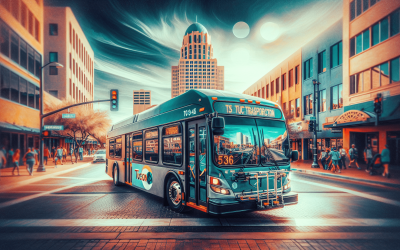So, you’re wondering if Tucson is a bike-friendly city? Well, let me give you the lowdown. Tucson, known for its incredible landscapes and year-round sunny weather, has made significant strides in becoming a haven for cyclists. With an extensive network of bike lanes, dedicated paths, and bike-friendly infrastructure, the city has certainly made it easier for cyclists to navigate their way around. However, like any other city, there are still a few areas that could use improvement. So, grab your helmet and let’s explore whether Tucson truly deserves its reputation as a bike-friendly city.
Bike Infrastructure
When it comes to bike infrastructure, Tucson offers a variety of options that cater to cyclists of all levels. The city is home to an extensive network of recreational trails, making it easy for residents and visitors to enjoy biking in a natural and picturesque setting. These trails, such as the Rillito River Park Trail and the Santa Cruz River Park Trail, provide a safe and enjoyable biking experience away from vehicular traffic, with beautiful scenery along the way.
For those who prefer a more urban biking experience, Tucson offers a well-developed bike lane system. Bike lanes can be found on many major streets and provide a dedicated space for cyclists, separate from motor vehicles. This not only enhances safety but also encourages more people to choose biking as a convenient mode of transportation.
In addition to recreational trails and bike lanes, Tucson has implemented a bike share program to promote a sustainable and active lifestyle. The program allows residents and tourists to rent bicycles for short-term use, making it easy to explore the city and run errands without relying on private vehicles. With several bike stations strategically located throughout Tucson, this initiative further supports the city’s commitment to reducing traffic congestion and carbon emissions.
To complement the existing bike infrastructure, Tucson has also implemented bike-friendly streets. These streets are designed with the needs and safety of cyclists in mind. They often feature traffic calming measures, such as reduced speed limits and enhanced signage, to create a more comfortable and secure environment for biking. Bike-friendly streets not only facilitate better connectivity between different parts of the city but also contribute to the overall livability and attractiveness of Tucson.
Cycling Culture
Tucson boasts a vibrant and active cycling community, making it a haven for biking enthusiasts. The city is home to numerous cycling clubs and advocacy groups that work tirelessly to promote cycling as a healthy and sustainable mode of transportation. These organizations organize group rides, offer cycling education courses, and advocate for improved bike infrastructure and safety measures.
One notable group is the Tucson Bicycle Advisory Committee, which advises the city council on matters related to cycling and helps shape future policies and initiatives. Their dedication to promoting the interests of cyclists ensures that the voice of the cycling community is heard and actively incorporated into urban planning decisions.
In addition to advocacy groups, Tucson hosts various events and initiatives that celebrate and promote cycling culture. Bike Month, held annually in April, is a month-long celebration of all things biking. This event features organized rides, educational workshops, and community gatherings aimed at bringing cyclists together, raising awareness about biking as a mode of transportation, and encouraging more people to give cycling a try.
Another popular event is Cyclovia Tucson, which transforms select city streets into car-free zones for a day. This event allows cyclists and pedestrians to explore the city at their own pace, free from the concerns of vehicular traffic. Cyclovia Tucson not only promotes physical activity and healthy lifestyles but also fosters a sense of community and social interaction among participants.
For those who enjoy combining their love for cycling with other forms of entertainment, Tucson’s Bike-In Movies are a must-attend event. These outdoor movie screenings are specifically designed for cyclists, who can ride to the designated location, park their bikes, and enjoy a movie under the stars. Bike-In Movies not only provide a unique and enjoyable experience but also highlight the city’s commitment to creating a fun and inclusive environment for cyclists.
Safety Measures
Tucson prioritizes the safety of cyclists through various measures, including bicycle education and the enforcement of traffic laws. The city actively promotes bicycle education programs aimed at both cyclists and motorists. These programs educate cyclists on safe riding practices, such as proper signaling, adherence to traffic laws, and the use of appropriate safety gear. By empowering cyclists with the knowledge and skills needed to navigate the city’s streets safely, Tucson reduces the likelihood of accidents and promotes responsible biking habits.
Simultaneously, Tucson is committed to enforcing traffic laws that protect the rights and safety of cyclists. By holding motorists accountable for their actions and ensuring they respect the presence of cyclists on the road, the city promotes a safer environment for all road users. Strict enforcement of traffic laws not only deters dangerous driving behaviors but also fosters a culture of mutual respect between motorists and cyclists.
Public Transportation Integration
Recognizing the benefits of integrating different modes of transportation, Tucson has implemented policies and initiatives that promote a seamless combination of bikes and public transportation. The city allows bicycles on buses, making it easier for cyclists to extend their reach and travel longer distances. By being able to bring their bikes on board, cyclists have increased flexibility in planning their routes and can conveniently switch between cycling and public transit to reach their destinations.
Furthermore, Tucson has also made provisions for bikes on light rail. The Sun Link streetcar system, which connects various destinations throughout Tucson, is designed to accommodate bicycles. This integration enables cyclists to conveniently combine biking with light rail travel, providing a wider range of commuting options and reducing reliance on private vehicles.
The integration of bikes with public transportation not only promotes mobility but also helps reduce congestion and air pollution. By encouraging the use of multiple transportation modes, Tucson enhances transportation accessibility and supports a more sustainable and environmentally friendly city.
Supportive Policies
Tucson’s commitment to becoming a bike-friendly city is reflected in its adoption of supportive policies, such as the Master Bicycle Plan and the Complete Streets Policy. The Master Bicycle Plan serves as a comprehensive blueprint for the development and improvement of bike infrastructure in Tucson. It outlines specific goals, strategies, and projects to enhance cycling accessibility, safety, and connectivity throughout the city. This long-term plan ensures that future developments consider the needs of cyclists and that Tucson continues to expand and evolve its bike network.
The Complete Streets Policy is another vital policy that underscores Tucson’s commitment to inclusive and accessible transportation. This policy requires that all road projects consider the needs of all users, including cyclists, pedestrians, and public transit riders, when designing and constructing streets. By prioritizing the creation of safe and accessible streets for all road users, Tucson enhances the overall livability, equity, and connectivity of the city.
These supportive policies not only provide a framework for positive change but also highlight Tucson’s dedication to fostering a culture of active transportation and creating a city where biking is safe, convenient, and enjoyable for all.
Bicycle Commuting
Tucson recognizes the importance of promoting bicycle commuting as a viable and sustainable mode of transportation. The city offers several programs to encourage and support bike commuters, such as bike commuter incentives and secure bike parking.
Bike commuter programs provide incentives and rewards for cyclists who choose to commute to work by bike. These initiatives often include benefits such as discounted bike gear, access to showers and changing facilities at workplaces, and even financial incentives for those who regularly commute by bike. By offering these incentives, Tucson acknowledges the role of bike commuters in reducing traffic congestion and promoting healthy lifestyles.
Secure bike parking is another essential aspect of supporting bicycle commuting. Tucson provides designated areas with secure bike racks or lockers to ensure that cyclists have a safe place to park their bikes while they go about their daily routines. These secure parking options not only protect bikes from theft or damage but also provide peace of mind for cyclists, encouraging more people to choose biking as a reliable and convenient mode of transportation.
By providing incentives and secure parking options, Tucson actively supports and encourages bicycle commuting, contributing to the overall livability, sustainability, and well-being of the city.
Infrastructure Challenges
While Tucson has made significant progress in developing its bike infrastructure, it still faces some challenges that need to be addressed to improve connectivity and accessibility for cyclists. One of these challenges is the lack of connectivity in certain areas of the city. While there are many bike-friendly streets and dedicated bike lanes, there are still gaps in the network that make it challenging for cyclists to navigate certain parts of Tucson. Addressing this lack of connectivity by filling these gaps would enhance the biking experience and encourage more people to use bicycles as a mode of transportation.
Another challenge that Tucson faces is limited bike lanes in certain areas. While the city has made efforts to create a comprehensive bike lane system, some neighborhoods and streets still lack dedicated biking infrastructure. This can discourage cyclists from using bikes as a means of transportation and limit their access to essential destinations. Expanding the bike lane network to encompass all parts of Tucson would improve safety and encourage more people to incorporate cycling into their daily lives.
Safety Concerns
Despite Tucson’s commitment to cyclist safety, there are still concerns regarding high accident rates and the lack of respect from motorists. Tucson has seen a relatively high number of bicycle-related accidents in recent years, and reducing these accident rates remains a priority for the city. Enhancing safety measures, improving infrastructure, and raising awareness among motorists about the rights and vulnerabilities of cyclists are crucial steps in reducing bicycle accidents.
Additionally, the lack of respect from some motorists toward cyclists poses a safety concern. This can manifest in aggressive driving behaviors, failure to yield to cyclists, or a lack of understanding about sharing the road with bicycles. To address this concern, Tucson continues to focus on education and awareness campaigns to promote understanding and mutual respect among all road users.
Potential for Improvement
Despite the challenges that Tucson faces regarding bike infrastructure and safety, there is significant potential for improvement. Expanding the bike network is a key step in enhancing connectivity and making biking a more accessible choice for all residents. This could involve filling the existing gaps in the network, creating additional bike lanes, and developing more recreational trails to ensure that cyclists have diverse and safe options for traveling within the city.
To support these improvements, increased funding for bike projects is essential. By allocating more resources to bike infrastructure development, Tucson can accelerate the implementation of new projects, enhance existing infrastructure, and invest in ongoing maintenance and safety upgrades. Increased funding would also allow the city to invest in research and data analysis to further enhance their understanding of the needs and preferences of cyclists, enabling more informed decision-making when it comes to future developments.
By expanding the bike network and increasing resources for bike projects, Tucson can continue on its path towards becoming an even more bike-friendly city, with enhanced accessibility, safety, and a thriving cycling culture. Through ongoing collaboration between government entities, advocacy groups, and the community, Tucson can build upon its existing strengths to provide a city that caters not only to cyclists’ needs but also to the broader goals of sustainability, equity, and livability.










